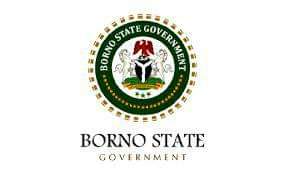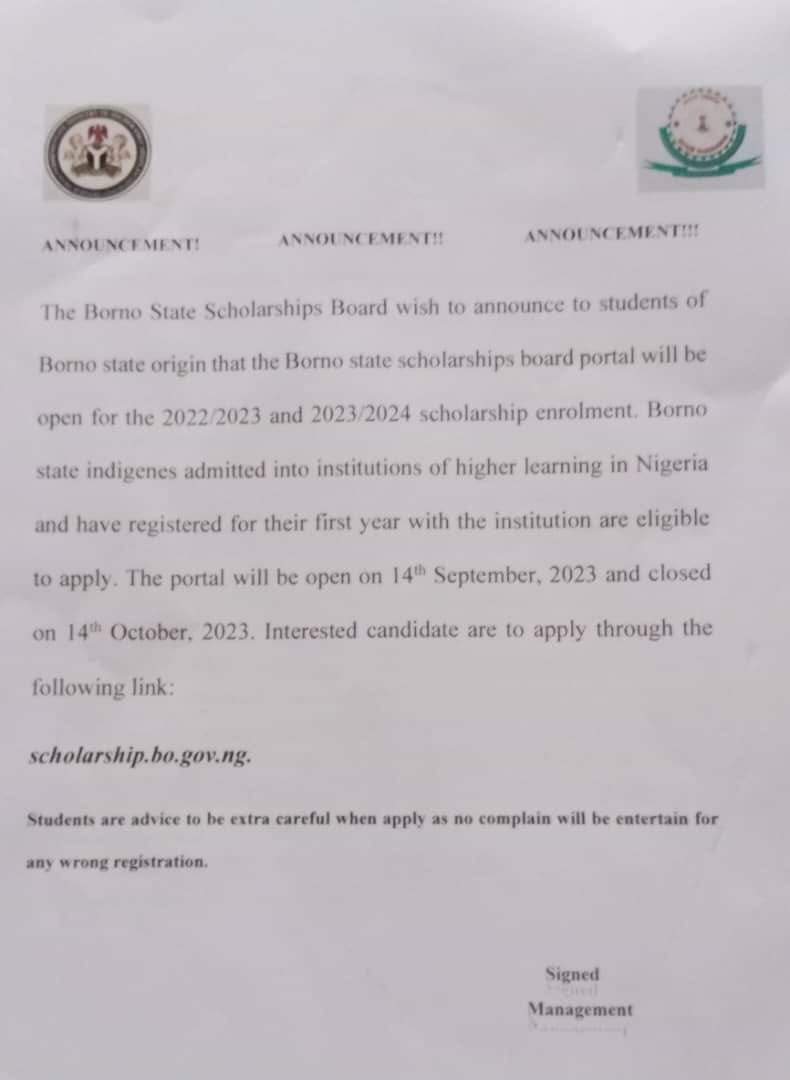Borno State Government’s Remarkable Initiative: 2,000 Foreign Scholarships for Aspiring Students
Borno State Scholarship committee members.

Borno State Government’s Remarkable Initiative: 2,000 Foreign Scholarships for Aspiring Students
Introduction
Education is a beacon of hope and progress, and Borno State Government is taking a significant step forward by offering 2,000 foreign scholarships to ambitious students. This transformative initiative not only opens doors to global educational opportunities but also represents a commitment to empowering the youth and building a brighter future. In this blog post, we’ll delve into the significance of this scholarship program and its potential impact on the lives of the beneficiaries and the state as a whole.

Empowering the Youth
- Access to Global EducationThe Borno State Government’s decision to offer foreign scholarships provides students with access to world-class education and diverse cultural experiences.
- Investing in Human CapitalEducation is an investment in human capital, equipping students with the knowledge and skills needed to drive economic growth and development.
The Scholarship Initiative
- 2,000 ScholarshipsThe scale of the program, offering 2,000 scholarships, demonstrates the state’s commitment to providing educational opportunities to a substantial number of students.
- Diverse Fields of StudyScholarships are often available for various fields of study, allowing students to pursue their academic interests and passions.
- Global ExposureStudying abroad not only imparts academic knowledge but also exposes students to diverse cultures and perspectives, enhancing their global outlook.
Impact on Students
- Access to Quality EducationThe scholarships remove financial barriers, making quality education abroad accessible to students who may not have had such an opportunity otherwise.
- Cultural EnrichmentStudying abroad fosters cultural enrichment, promoting a global perspective and cross-cultural understanding among students.
- Skill DevelopmentInternational exposure hones students’ adaptability, problem-solving, and intercultural communication skills, preparing them for a globalized workforce.
Navigating the Scholarship Process
- Eligibility and RequirementsInterested students should carefully review the scholarship program’s eligibility criteria and requirements.
- Application ProcessStaying informed about the scholarship application process, including deadlines and required documentation, is crucial.
- Preparation and ResearchPreparing for the scholarship application may involve gathering necessary documents, seeking letters of recommendation, and crafting compelling personal statements.
A Brighter Future for Borno State
- Knowledge TransferGraduates of the scholarship program can bring back their knowledge and expertise to contribute to the development of Borno State.
- Global AmbassadorsThese scholars become global ambassadors for the state, fostering international relationships and collaborations.
- Economic GrowthA highly educated workforce can attract investment and drive economic growth in Borno State.

Unlocking Opportunities: The Significance of Access to Global Education
Education has always been a passport to opportunity, but access to global education takes this concept to new heights. In today’s interconnected world, the ability to access quality education on a global scale has become a game-changer for individuals and communities. In this blog post, we will explore the profound impact of access to global education, its benefits, and how it is shaping the future of learning.
The Power of Global Education
- Breaking Down Geographic BarriersAccess to global education transcends geographical boundaries, enabling learners to access educational resources and institutions worldwide.
- Diverse Learning ExperiencesGlobal education introduces learners to diverse cultures, perspectives, and teaching methods, enriching their learning experiences.
- Enhanced Career OpportunitiesEducation from renowned international institutions can open doors to global job markets and career opportunities.
Benefits of Access to Global Education
- Quality and ExpertiseMany of the world’s top-ranked universities and institutions are globally recognized for their high-quality education and expert faculty.
- Cultural EnrichmentExposure to diverse cultures and languages broadens students’ horizons, fosters tolerance, and promotes cross-cultural understanding.
- Innovation and ResearchInternational collaborations in education drive innovation and research, pushing the boundaries of knowledge and technology.
How Access to Global Education Is Facilitated
- Online Learning PlatformsThe rise of online education platforms has made it easier for students worldwide to access courses from top universities.
- Scholarships and GrantsScholarships and grants, often offered by governments and institutions, reduce financial barriers to studying abroad.
- Exchange ProgramsStudent exchange programs and study abroad initiatives encourage cross-border learning experiences.
Impact on Individuals
- Personal GrowthGlobal education fosters personal growth by challenging students to adapt to new environments and ideas, building resilience and independence.
- Career AdvancementGraduates with international education often enjoy better career prospects and higher earning potential.
- Global CitizenshipAccess to global education cultivates global citizens who are aware of global challenges and are motivated to create positive change.
Impact on Communities and Societies
- Economic DevelopmentA highly educated workforce can drive economic growth and attract investment to communities and regions.
- Social DevelopmentEducation equips individuals with the skills and knowledge needed to address social issues and drive positive change in their communities.
- Cultural ExchangeGlobal education fosters cultural exchange, promoting understanding and tolerance among diverse communities.
Investing in Human Capital: The Key to Prosperity and Progress
In today’s knowledge-driven world, the concept of “human capital” has gained prominence as a critical driver of economic growth, innovation, and social development. Investing in human capital means nurturing the knowledge, skills, and health of a nation’s population, thereby creating a foundation for individual and collective success. In this blog post, we’ll delve into the significance of investing in human capital, its impact on society, and why it’s an essential strategy for prosperity and progress.
Understanding Human Capital
- What Is Human Capital?Human capital encompasses the knowledge, skills, education, and health of a population. It represents the productive potential and intellectual capacity of individuals.
- Why Is It Important?Human capital drives economic productivity, innovation, and overall societal well-being. It’s the engine that powers progress.
The Economic Benefits
- Productivity BoostA skilled and healthy workforce is more productive, contributing to higher economic output and competitiveness.
- Innovation and GrowthHuman capital fuels innovation and technological advancements, propelling economic growth and development.
- Global CompetitivenessNations with well-educated and skilled populations are more competitive in the global marketplace.
Social and Individual Advantages
- Quality of LifeInvestments in human capital lead to improved living standards, better healthcare, and increased life expectancy.
- Reducing InequalityFostering human capital can help reduce income inequality by providing equal access to education and opportunities.
- Empowering IndividualsEducation and skills empower individuals to lead fulfilling lives, make informed decisions, and contribute to their communities.
Investing in Human Capital
- EducationHigh-quality education, from early childhood through higher education, is a primary driver of human capital development. Accessible, equitable, and inclusive education is crucial.
- HealthcareAccess to healthcare services, preventive care, and nutrition programs are essential for maintaining and enhancing human capital.
- Skills DevelopmentLifelong learning and skills development programs enable individuals to adapt to changing job markets and industries.
Public and Private Roles
- Government InvestmentsGovernments play a central role in investing in human capital through policies, funding for education and healthcare, and social safety nets.
- Private SectorEmployers can invest in human capital through employee training and development programs, creating a skilled and adaptable workforce.
- Civil SocietyNon-governmental organizations and community initiatives can fill gaps in education and healthcare access.
Conclusion
The Borno State Government’s decision to offer 2,000 foreign scholarships is a transformative investment in the youth and the future of the state. By providing access to quality education and global opportunities, this initiative has the potential to empower generations of students, enrich the cultural fabric of the state, and contribute to its economic development. As these scholars embark on their educational journeys abroad, they carry with them the hopes and aspirations of their communities, promising a brighter, more prosperous future for Borno State.
arewanahiya.com







